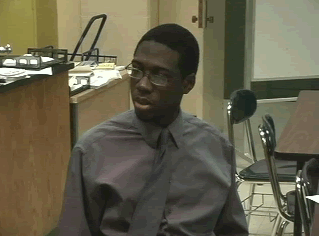December 7: Group Discussion of Interracial Dating: Making Connections Between Students' Lives and Othello
|
|
|
|
Travis organized a discussion of interracial dating in order to bring out some of the issues in Othello and make connections to the students' own lives. He begun by asking the students to write some of their thoughts about and experiences with interracial dating. He then passed out two balls of paper to each student and told them that he wanted each one of them to make one comment, throw one ball into the center of the room, and then call on another student. He told them that only after every student had made one comment could they make another comment. The discussion proceeded with some silences, but Travis sat or walked outside the circle and waited, letting the students call on each other. At one point, students made some connections to Romeo and Juliet (which they read the previous year); the discussion took off when one student commented that Shakespeare shows that "love does not conquer all." Although Travis' original plan was to summarize the students' conversation, make some connections to Othello himself, and then to move on to talk about Iago's soliloquoy, he decided to let the conversation run, and then invited the students to make some connections between the issues raised in their discussion and Othello's experiences. He finished the period by asking students to reflect on the discussion. |
| After class, an observer talks with Travis about what he had planned, why he decided to let the discussion run, how he thought the discussion went, how it compares to other discussions they've had, how he creates a climate in which students are willing and able to talk with one another, and the consequences of letting the discussion run for his schedule and efforts to stay "on pace." |
| (0:00) Travis begins by talking about students' familiarity with visitors and then his plans for the next classes. |
| (2:45) Travis talks about letting the discussion go longer than planned.
"I had only planned for one period for the conversation, but I heard Pam (a teacher from his teacher education program) in the back of my head saying "allow it to go, allow it go, allow it to go."
|
| (4:00) Travis discusses how the documentation of the rest of the unit might proceed.
"I'm planting these kinds of seed that I'm planning to water in the coming weeks."
|
| (4:40)
Travis shares his reflections on the day and talks about his original plans for the discussion. |
| (6:00)
Travis discusses how some students were able to make connections between their discussion and Othello and to make "text-to-text" connections with Romeo and Juliet (which they read the previous year) and Oedipus (which they read before Othello). |
| (7:30) Travis talks about how this discussion was different from other class discussions they've had.
"We've never had a group discussion this extensive before."
"I think the silence was uncomfortable for them, and I just allowed the silence to sit until they felt the need to say something or call on someone. There were moments where I actually wanted to read my piece, but I waited until the end until everyone else had gone."
|
| (9:20)
Travis discusses a previous conversation they had about Socrates and Aristotle that was more "forced." He talks about getting the idea for the paper balls from a class he had in his teacher education program (The STEP Program) |
| (11:45) Travis reflects on the conversation and expresses concerns about how to get everyone to talk. |
| (13:00)
Travis describes the thinking behind his decision to let the conversation continue instead of wrapping it up and moving on to the other activities he had planned. |
| (16:00)
Travis discusses how this experience has influenced his thinking about how to organize this same discussion with the other class he teaches. |
| (19:45)
Travis discusses other concerns about the discussion. |
| (20:42) Tape Change |
| (21:10)
Travis talks about some of the aspects of the class (including journal writing, the size of the school, the seating arrangement) that may help to create an atmosphere in which students can talk about how they feel and feel free to explore sensitive issues. |
| (25:30)
Travis discusses how he responds to the issue that some people believe that time would be better spent focusing directly on the text rather than having students talk about aspects of their personal lives. |
